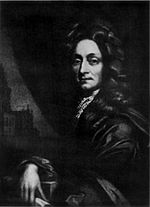Christopher Wren

Sir Christopher Wren (October 20, 1632 - February 25, 1723) was an English architect of the seventeenth century, famous for his role in the re-building of London's churches after the Great Fire of London of 1666.
Life and Times
Wren is particularly known for his design for St Paul's Cathedral, one of very few cathedrals in England to have been built after the medieval period, and the only Renaissance cathedral in the country. An inscription inside the cathedral, dedicated to the architect, reads, "Lector, si monumentum requiris, circumspice" ("Reader, if you seek his memorial, look around you").
Born in 1632 in Wiltshire, Wren was the son of the dean of Windsor. His academic career was centered at Oxford, where he was a member of both Wadham and All Soul's Colleges. In 1657, he became professor of astronomy at Gresham College and four years later he became the Savilian Professor of astronomy at Oxford until his resignation in 1673. Wren was also one of the founding members of the Royal Society, of which he was president from 1680 to 1682.
His first serious architectural venture was the Sheldonian Theatre, which can still be seen at Oxford, and he designed various other university buildings in both Oxford and Cambridge.
After the Great Fire of London, he was selected as the architect of St Paul's, the previous building having been destroyed. The design and construction of the new cathedral took from 1675 to 1710, and in the interim Wren designed many other buildings, including over fifty London churches, many of which remain standing. These include St Bride's, St Mary le Bow, St Clement Danes, St Benet Paul's Wharf, and St Stephen Walbrook. In addition, he was involved in the design of the Monument to the Great Fire of London, Royal Greenwich Observatory, Chelsea Hospital, Greenwich Hospital, Marlborough House, the Ashmolean Museum, the Wren Library, and many other distinguished buildings.
Christopher Wren was Knighted in 1673 and also served as a member of Parliament in 1685-1688 and 1702-1705.
Wren died in 1723 and was buried at St Paul's.
Major works attributed to Wren
Chapels
- Pembroke College Chapel, Cambridge
- Emmanuel College Chapel, Cambridge
- Catholic Chapel, Whitehall Palace
Churches

Surviving
- St Andrew by the Wardrobe, London
- St Andrew, Holborn, London
- St Anne and St Agnes, Gresham Street, London
- St Benet Fink, Threadneedle Street, London
- St Benet Paul's Wharf, Queen Victoria Street, London
- St Bride, Fleet Street, London
- St Clement Danes, Strand, Westminster
- St Clement Eastcheap, London
- St Dunstan in the East, London
- St Edmund the King, Lombard Street, London
- St James Garlickhythe, Garlick Hill, London
- St James's Piccadilly, Westminster
- St Lawrence Jewry, London
- St Magnus Martyr, Lower Thames Street, London
- St Margaret Pattens, London
- St Margaret, Lothbury, London
- St Martin Ludgate, London
- St Mary Abchurch, London
- St Mary Aldermanbury, London
- St Mary-at-Hill, Thames Street, London
- St Mary-le-Bow, Cheapside, London
- St Michael Paternoster Royal, College Hill, London
- St Michael, Cornhill, London (tower and upper half of main building)
- St Nicholas Cole Abbey, London
- St Paul's Cathedral
- St Peter upon Cornhill, Cornhill, London
- St Stephen Walbrook, London
- St Vedast alias Foster, Foster Lane, London
- Enlarged the Protestant Church in the Savoy, London
- Ingestre Church, Staffordshire
Destroyed
- All Hallows the Great, Lombard Street, London
- All Hallows, Bread Street, London
- All Hallows, Lombard Street, London
- Christ Church Newgate, Newgate Street, London
- St Alban, Wood Street, London
- St Anne's Church, Soho
- St Antholin, Watling Street, London
- St Augustine with St Faith, Watling Street, London
- St Bartholomew-by-the-Exchange, Exchange, London
- St Benet, Gracechurch Street, London
- St Christopher-le-Stocks, Threadneedle Street, London
- St Dionis Backchurch, Fenchurch Street, London
- St George, Botolph Lane, London
- St Mary Aldermary, Bow Lane, London
- St Mary Magdalene, Old Fish Street, London
- St Mary Somerset, Thames Street, London
- St Matthew, Friday Street, London
- St Michael Queenhithe, Upper Thames Street, London
- St Michael, Crooked Lane, London
- St Michael, Wood Street, London
- St Mildred, Bread Street, London
- St Mildred, Poultry, London
- St Olave Old Jewry, London
- St Stephen Coleman, Coleman Street, London
- St Swithin London Stone, Cannon Street, London
College Halls of Residence
- Garden Quadrangle, Trinity College, Oxford
- Williamson Building, The Queen's College, Oxford
Court Rooms
- Court House, Windsor
Gateways & Entrances
- Temple Bar, London
- Tom Tower, Christ Church, Oxford
Government Offices
- The Custom House, London
- The Navy Office, Seething Lane, London
Guard Houses
- Guard House, Windsor Castle
Hospitals
- The Royal Hospital, Chelsea
- Royal Naval Hospital, Greenwich
Houses
- Tring Manor House, Hertfordshire
- Thoresby House, Nottinghamshire
- Bridgewater Square Development, London
- Winslow Hall, Buckinghamshire
- Marlborough House, St James's, London
Libraries
- Lincoln Cathedral Library, Lincoln
- Trinity College Library, Cambridge
Monuments
- The Monument, Fish Street Hill, London
Observatories & Scientific Buildings
- The Royal Observatory, Greenwich
- Repository, Royal Society, Crane Court, Fleet Street, London
Palaces
- Winchester Palace, Winchester
- Catholic Chapel, Council Chamber and Privy Gallery, Whitehall Palace
- Queen's Apartment and Terraced Garden, Whitehall Palace
- South and East Ranges, Hampton Court Palace
- Reconstruction of Kensington Palace
Schools & Colleges
- Upper School, Eton College, Buckinghamshire
- Writing School, Christ's Hospital, London
- St John Moore's School, Appleby, Leicestershire
- College of William and Mary, Williamsburg, Virginia, USA
Theatres
- Sheldonian Theatre, Oxford (not for plays but for University ceremonies)
- Drury Lane Theatre, London
